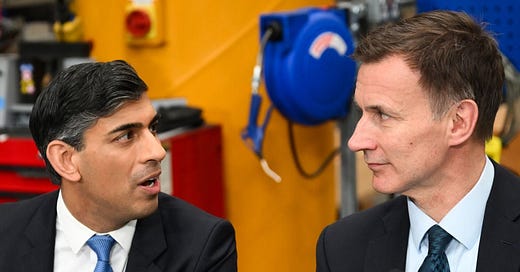Good morning. George Galloway made a stark warning on his first day in parliament: the next general election “will be about Muslims [and] the taking away of civil liberties”. His presence has triggered a fresh narrative from Rishi Sunak: that the government must do more to tackle extremism.
But at what cost? A few thoughts below. Then, George Eaton talks to Torsten Bell, Paul Johnson, and others about how Labour will respond to the Budget, which Morning Call subscribers can read within the email – the day’s recommended piece will now be sent in full to everyone in the paid tier.
Thanks to everyone who subscribed yesterday! To clarify, a Morning Call subscription is separate to a New Statesman subscription. If you have an NS subscription, you can still find all the paid-tier articles on the website. But you won’t get Ben’s daily polling analysis, Mailshot, or my random book and film recommendations – you’ll be missing out, trust me. This week subscriptions are 10 per cent off, or £3 a month.
Go on, then: define “British values”. Try to be more specific than “a sense of fair play”. It’s quite hard, isn’t it? Now try to create a legally watertight definition, one you would trust the state to use when deciding whether or not you are an “extremist”.
Here is the government’s attempt. It defines extremism as: “Vocal or active opposition to our fundamental values, including democracy, the rule of law, individual liberty and the mutual respect and tolerance of different faiths and beliefs.”
But the government wants to toughen this up. Rishi Sunak has tasked Michael Gove with tightening this definition, which would be used to exclude individuals from state funding and engagement. According to the Times, the new definition could include promoting an ideology that undermines the “rights or freedoms of others” or the UK’s liberal system of democracy and democratic rights.
Critics of Tony Blair’s constitutional reforms beware. The same goes for House of Lords abolitionists. I’m being facetious, surely? But what if the constitutional sceptics in our midst call MPs – as guardians of the current system – illegitimate? What if an SNP MP sent a combative tweet calling for the “British liberal system” to be replaced with a newly independent Scottish state?
Another problem for the government is that rights often compete with one another. The right to get to the hospital when you are injured can conflict with the right of Just Stop Oil to protest. The right of transwomen to be treated as women can conflict with the right of biological women to non-male spaces. The wealthy’s right to private property is undermined through redistributive tax policy. Political action – or even calling for political action – can sometimes necessarily involve undermining the rights of others.
Silly? Hyperbolic? Whatever your thoughts, these are the types of concerns being raised in the Conservative Party. Miriam Cates MP said yesterday: “What does it even mean to ‘undermine British values’ when there is no consensus – and certainly no legal definition – of what those values are?”
This gets to the heart of the political risk for Rishi Sunak. The new definition is being framed as the meat behind the Prime Minister’s speech on Friday about the growing threat of extremism. This seems to be yet another political strategy from Sunak: frame the Conservatives as the protector of British values to force Labour into a tricky position over free speech surrounding Gaza.
Will it work? As ever, he is facing opposition from within the party – something that will distract from any misstep from Labour. This is only the latest attempt to shift the narrative beyond the economy. Take small boats, defending motorists against 20mph speed limits, or railing against a hypothetical meat tax. The problem, though, is that the political fundamentals – that people are angry with public services, that they feel worse off than four years ago, and that they hold the Conservatives partly responsible – have not changed.
Freddie’s picks
It’s Super Tuesday in the US. Donald Trump is grinding towards the Republican nomination. Here’s the problem, Geoffrey Wheatcroft writes: “In 2016 Joe Biden would have defeated Donald Trump. In 2020 Biden did beat Trump. In 2024 Biden will lose to Trump.”
Is a two-state solution actually achievable? Lawrence Freedman investigates.
Here’s Sarah Manavis on Labour’s proposals for state-sponsored TikTok-ers to counter Andrew Tate, which many of you emailed about last week. It won’t work, she argues.
David Wilkinson thinks Manchester’s skyscraper boom is driving out the working class (Tribune).
Join Morning Call and read on for the recommended piece, Mailshot, Ben’s take and the sign-off each day. Thanks to Steve and everyone else who subscribed yesterday.
The Budget won’t save the Tories
Jeremy Hunt’s Budget is not designed to save the British economy – it is designed to save the Conservative Party. The Chancellor’s haphazard quest to fund tax cuts is driven by politics, not economics. A party now polling almost as poorly as it was under Liz Truss is desperately searching for a life raft.
Like George Osborne before him, Hunt is seeking to trap Labour by controlling “the baseline”. Should the opposition diverge from his fiscal plans, he will accuse it of planning a tax or borrowing “bombshell”.
The Chancellor is threatening to sharpen Labour’s dilemma by poaching two of the party’s biggest revenue raisers: the abolition of non-dom status (a measure first proposed by Ed Miliband in 2015) and an extended windfall tax on oil and gas companies. Opposition aides say they have long anticipated the Tories’ act of political plagiarism but, for now, refuse to specify their plan B.
Click through to the NS to read the rest, or MC subscribers can read in full in-email.
Keep reading with a 7-day free trial
Subscribe to Morning Call to keep reading this post and get 7 days of free access to the full post archives.









